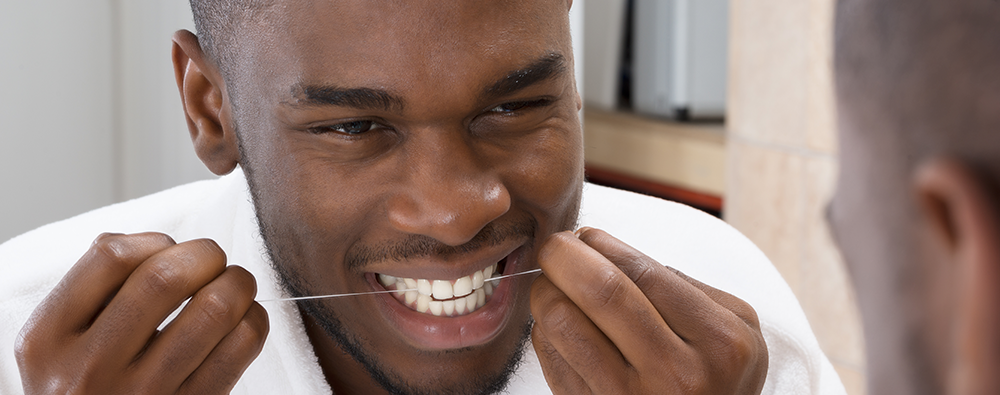Actually, no dental hygienist asks that question. But it does raise a third question: “Are you using the right floss?” In case you’re not satisfied with the performance of your current floss or just want to better understand your options, let’s take a step back and evaluate what the pros and cons are of each type of floss.
Dental Floss Types
There’s a whole section of the dental aisle dedicated to a wide variety of flosses. You can find most, if not all of these 8 options in that section:
Unwaxed Floss: It’s made of thin nylon strands. Typically, it has no flavor.
- Pro: It fits into tight spaces. Its non-slip grip property makes it easier to hold, and results in you using less actual floss. This might be a good option for you if your teeth are close together.
- Con: It’s not very sturdy. The strands could fray, and there could be breakage or snapping during use.
Waxed Floss: It’s made of standard nylon with a light wax coating. It may have a mint or cinnamon flavor.
- Pro: The wax coating makes it easier for the floss to slide between teeth. It’s sturdier than unwaxed floss, so no fraying or breakage during use.
- Con: It’s thicker than unwaxed floss, making it more difficult to get into smaller gaps. The slickness of the wax also makes it harder to grip and the texture of the wax may be unpleasant to some.
PTFE Floss: It’s made of polytetrafluorethylene, the same material that’s used in high-tech Gore-Tex fabric.
- Pro: It slides between your teeth with ease for those with crowded teeth and challenging dental work.
- Con: Due to the use of Perfluorooctanoic acid, a possible carcinogen, in the making of Teflon (PTFE), many oral health professionals often recommend the use of a non-PTFE product. These perfluorinated compounds are not only suspected as carcinogenic, but can potentially compromise your immune system and affect hormone levels because they are endocrine disruptors. We recommend consulting your dentist if you have any concerns.
Dental Tape: It’s thicker and flatter than regular floss. It comes in both waxed and unwaxed.
- Pro: Because the floss is thick, it’s a good option if you someone that has bigger gaps between your teeth. It’s also a lot less likely to break.
- Con: It your teeth are crowded together, it might be difficult to floss it between your teeth.
Super Floss: It’s a pre-threaded flosser that comes in pre-cut segments. It has a stiff end that helps thread it through tight areas.
- Pro: It’s great for removing plaque around bridges, braces, and implants.
- Con: This floss isn’t the most ideal for individuals with narrow gaps between their teeth.
Electric Flosser: It has a sturdy fishing line-like nylon that vibrates between the teeth in an oscillating motion.
- Pro: It’s a great alternative for those who have difficulty maneuvering floss.
- Con: It can be hard on the gum line. Overzealous flossing can actually change the shape of your gum tissue, especially in the part of your smile that can be seen.
Natural & Biodegradable Floss: The environmentally friendly option.
- Pro: Some brands make floss out of silk which will biodegrade in a landfill, and may even compost in your yard.
- Con: Although biodegradable, some environmentalists and animal rights activists are concerned with the impact silk dental floss production has on the insects that make the silk.
Water Flosser: It’s a cleaning device that shoots a thin stream of water between your teeth or at the gum line. This product can remove food particles and plaque with ease.
- Pro: It is easy to use and doesn’t produce waste. This is a good option for those with braces, or other types of dental work where using regular floss can be difficult.
- Con: On top of the higher price range, water flosses may be harder to use outside the home due to the product’s use of electricity and water.
Want to learn more?
Talk to your dentist. They’ll help you find the best floss for your oral health needs.
Don’t have a dentist? Create or sign in to your MySmile® account to search for an in-network dentist near you. You can even filter your results by patient endorsements!


